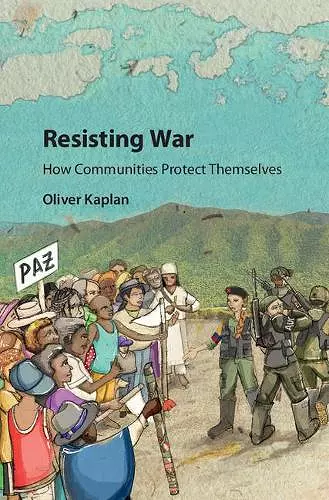Resisting War
How Communities Protect Themselves
Format:Hardback
Publisher:Cambridge University Press
Published:20th Jul '17
Currently unavailable, and unfortunately no date known when it will be back
This hardback is available in another edition too:
- Paperback£34.00(9781316612446)

This book explores how local social organization and cohesion enable covert and overt nonviolent strategies.
Based on fieldwork and statistical analysis, this book explains how local social organization and cohesion enable both covert and overt nonviolent strategies, including avoidance, cultures of peace, protest, and negotiation. These 'autonomy' strategies help civilians retain their agency and avoid becoming helpless victims by limiting the inroads of armed groups.In civil conflicts around the world, unarmed civilians take enormous risks to protect themselves and confront heavily armed combatants. This is not just counterintuitive - it is extraordinary. In this book, Oliver Kaplan explores cases from Colombia, with extensions to Afghanistan, Pakistan, Syria, and the Philippines, to show how and why civilians influence armed actors and limit violence. Based on fieldwork and statistical analysis, the book explains how local social organization and cohesion enable both covert and overt nonviolent strategies, including avoidance, cultures of peace, dispute resolution, deception, protest, and negotiation. These 'autonomy' strategies help civilians retain their agency and avoid becoming helpless victims by limiting the inroads of armed groups.
'We have thousands of books and articles on how armed men threaten unarmed civilians, but very few on the important and fascinating phenomenon of how the civilians protect themselves and fight back. This compelling book fills the gap and represents an important turn in the study of violence, from how it is committed to how it is mitigated.' Steven Pinker, Johnstone Professor of Psychology, Harvard University and author of The Better Angels of Our Nature
'In this path-breaking book Oliver Kaplan shows that in all the narratives about elites, rebels, guerillas, combatants etc. there was somebody missing: society. Patterns of peace and conflict, it turns out, depend on how society mobilizes, organizes, and negotiates. Combining theory, statistical analysis and extraordinary fieldwork in Colombia, Kaplan develops and tests a theory of just how society influences civil war.' James A. Robinson, University of Chicago and author of Why Nations Fail
'In the vast literature on civil wars, we have learned considerably about what motivates rebels to risk their lives to resist state power. In these accounts, civilians living in contested zones are typically portrayed as helpless victims adding only to the counts of collateral damage. Oliver Kaplan, in this brilliantly conceived study, challenges these dominant narratives and recasts peasants as anti-violence entrepreneurs. He discovers the conditions under which small rural communities can draw on their solidarity to avoid devastation from both rebels and the state, and avoid mass exodus to cities. Villagers can negotiate with both sides, Kaplan shows, to save their communities, preserving dignity and life while being protected from nearby death and destruction.' David D. Laitin, Stanford University, California
'The literature on building peace emphasizes the need to include and empower civil society as an antidote to violence and the lack of protection by the state. However, little is known about the conditions under which specific communities mobilize or what goes on under the surface of public protests. Kaplan's rich and colorful accounts of communities in Colombia and the vagaries they face show how they have confronted and appeased different violent actors. Kaplan's book should be required reading for anyone attempting to understand how communities are not only victims but also agents in violent contexts.' Angelika Rettberg, Director of the Master's in Peacebuilding program, Universidad de Los Andes, Colombia
'Kaplan warns U.S. policymakers against counterinsurgency or democracy-promotion strategies that could put the intended beneficiaries at risk by undermining their claims to neutrality.' Richard Feinberg, Foreign Affairs
'Resisting War makes a pioneering contribution to the study of civil conflict and insurgency. Kaplan's book is an exemplary piece of research that provides a captivating and rigorous telling of how civilians in conflict zones protect their own safety.' Dotan A. Haim, Perspectives on Politics
'Kaplan's book will be a cornerstone from which to tackle these questions in the future for a broader and deeper understanding of civilians' lives during civil wars. He should be applauded for asking big, important research questions that resist clean answers. Delving into civil war settings in a thoughtful way to provide rich description of how civilians experience and influence civil wars will form a lasting contribution to our knowledge about civil wars.' Abbey Steele, International Studies Review
ISBN: 9781107159808
Dimensions: 235mm x 158mm x 30mm
Weight: 730g
396 pages